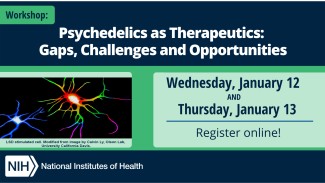NIH Workshop on Psychedelics as Therapeutics: Gaps, Challenges and Opportunities

Register now: https://www.eventbrite.com/e/workshop-on-psychedelics-as-therapeutics-gaps-challenges-opportunities-tickets-216497739567?keep_tld=1
The NIH Workshop on Psychedelics as Therapeutics is sponsored by the National Institute of Mental Health, the National Institute on Drug Abuse, and the National Institute on Alcohol Abuse and Alcoholism.
Hallucinogens, psychedelics, and entactogens all appear to induce similar changes in neural network growth and function and so are sometimes grouped as “psychoplastogens.” Data suggest that psychoplastogens may facilitate changes in memory, behavior, and thought patterns, an effect that can be harnessed to therapeutic benefit. Therefore, the purpose of the workshop is to examine findings related to psychoplastogens in the treatment of depression, post-traumatic stress, and substance, and alcohol use disorders.
The workshop will cover mechanistic understanding of psychoplastogens, discuss what settings are needed for a therapeutic effect and the necessity and nature of concomitant psychotherapies. Clinical study data will be presented with a view to understanding and overcoming challenges in conducting psychedelic research and identifying knowledge gaps. The design of clinical trials will be discussed, including how they might be conducted in a manner that complies with drug regulatory agency requirements. In addition, presenters will discuss how to design psychedelic therapies that can realistically and ethically be implemented and reimbursed by medical insurers.
The workshop will be a virtual “Zoom” meeting with participants in several time zones and pre-recorded 20 minute talks. Questions will be collected via “chat” during each talk. At the end of each session there will be a live presenter roundtable, with an expert moderator, who will highlight areas of controversy and the degree to which research limitations, confounds and implementation concerns can be addressed.
